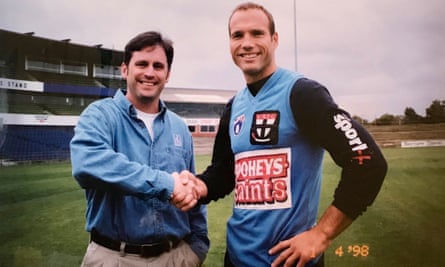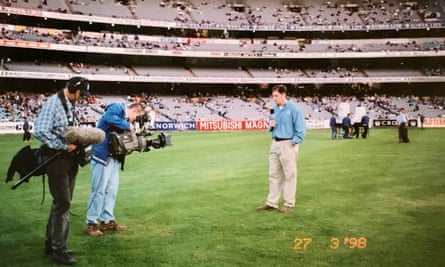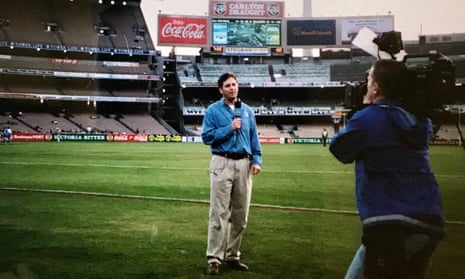Ed Wyatt has the most interesting CV in Australian sport. As a TV host and radio commentator he has called or reported on it all, but fans of Australian basketball, baseball and football in particular will recognise his West Coast accent. Before that he won Emmys as a regular cast member of the sketch comedy show Almost Live! That was during his time in Seattle around the turn of the 1990s when the zeitgeist resided in the Pacific Northwest.
In between those two lives Wyatt was part of a mob that bought the rights to broadcast the AFL in the USA, a story that includes the host of The Amazing Race, a star of Whose Line Is It Anyway, the brains behind BT Sport, and, most importantly of all, Wyatt’s wife, Michelle.
With Australian sport bucking the global trend and providing some distraction from the pandemic there has been no shortage of attempts to recruit American viewers unfamiliar to Australian rules football. In light of this, the Wyatts recently revisited their own missionary project as part of The Greatest Season That Was podcast series.

“It all came about because we wanted to watch the 1997 grand final between Adelaide and St Kilda on ESPN but the baseball that was on immediately beforehand went into extra innings, meaning the footy didn’t come on until midway through the opening quarter,” Wyatt explained to Guardian Australia. “No build-up, no anthems, and we were hosting a party at our place in Venice Beach, so we were furious.”
In those days fury might have, at worst, led to a strongly worded letter to ESPN HQ, or the cancellation of a subscription, but the Wyatts were both employees of the recently launched Fox Sports World, giving them a platform to take more decisive action.
Michelle Wyatt was a former producer of Channel Seven’s AFL coverage and the catalyst for the collective interest in the sport many miles from its heartland. Her Collingwood credentials go as far back as David Williamson’s seminal movie The Club where she appears in a crowd scene as a 12-year-old. She would later become the executive producer for Channel Ten’s popular series Before the Game.
Michelle leveraged her contacts back in Australia to bring Fox Sports World into the conversation for securing AFL broadcast rights to avoid a repeat of the grand final debacle. Those negotiations were handled at the Los Angeles end by Simon Green who secured a three-year deal for one live game per week, one edited three-hour match, and one edited two-hour match. This was worth nothing to the AFL in year one, $40,000 in year two and $80,000 in year three. 15 years later Green was the driving force behind BT Sport shaking up coverage of the Premier League in the UK in a deal worth £246m per season.
Fox Sports World only reached around 50,000 viewers by satellite, but the bigger carrot for the AFL was a route into America’s regional market under the umbrella of Fox Sports Net, where viewership jumped into the tens of millions. The campaign to grow subscribers mimicked the “I want my MTV” model of the 1980s with customers encouraged to call up their satellite provider at 1800 Fox World. Scripts to push this message via infomercials were written by Wyatt and voiced by Greg Proops and Phil Keoghan.

After a near 20-year relationship with ESPN that had run out of steam, the AFL supported the new enterprise with priority access to players like Wayne Carey and James Hird, enabling the creation of a series of profiles and an A to Z of Australian rules primer. On trips back to Melbourne the Wyatts enjoyed an unfettered gameday experience, including the recording of links from the centre square of the MCG before the opening bounce. “Probably the most nervous I’ve ever been on television,” Wyatt recalls.
The project peaked with the 1998 grand final. It was the first live broadcast accompanied by a dedicated pregame, hosted by Wyatt alongside the imported credentials of Gerard Healy. As part of the Fox Sports Net stable it was accessible in around 20 million homes.
For all the ingenuity and talent involved the game didn’t take a quantum leap Stateside. Fox Sports World slashed its budget, while the obvious hook of Australian rules football to outsiders - the collisions and violence - was being legislated out of the game and downplayed for marketing purposes. But at least there was no longer baseball stopping play. “I think we delivered,” said Wyatt.
The Wyatts relocated to Melbourne in 1999, mission somewhat accomplished. The AFL in the US has since gone full circle, first leaving Fox Sports World, spending a long time on the Setanta network, before eventually returning to Fox; still a niche offering, still with unrealised potential, still often viewed with mock-horror by disbelieving Americans wondering who forgot to bring the shoulder pads.
“We were maybe ahead of our time,” Michelle Wyatt considers. With US networks still short of live sport to broadcast (turning recently to Adelaide v Fremantle as primetime fodder), and sports radio hosts clamouring for anything to get excited about, that groundwork may, belatedly, be coming to fruition.
Hear more in The Greatest Season That Was Presents

Comments (…)
Sign in or create your Guardian account to join the discussion